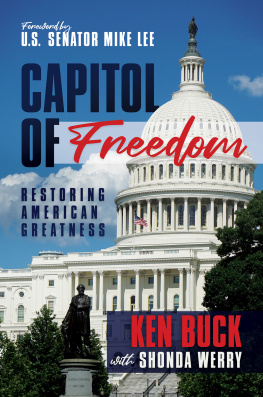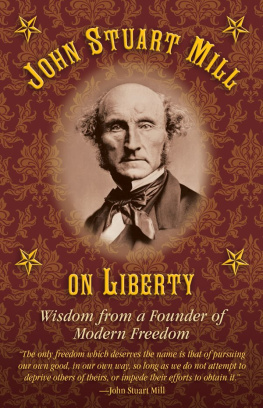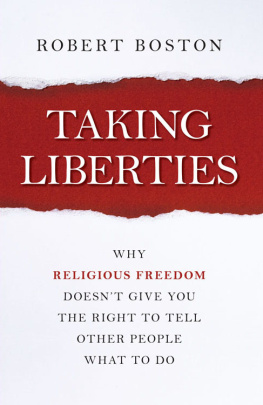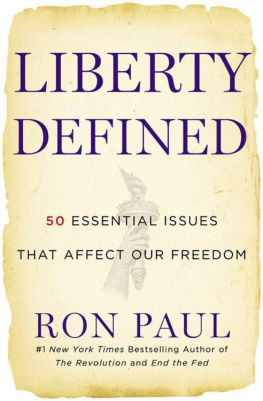Advance Praise for
Capitol of Freedom
A compelling perspective on the importance of congressional war powers, and how the Constitution can help us reorient our foreign policy.
Rand Paul , U.S. Senator
Ken Buck dismantles the progressives agenda and their motives behind the sham impeachment of President Trump. Capitol of Freedom is the definitive guide to understanding both the failures of the Left and the roots of American liberty.
Andy Biggs , U.S. Representative
Ken Buck provides a vigorous defense of the Second Amendment and all of our other cherished rights. Capitol of Freedom is a must-read for anyone looking to respond to the progressives attacks on liberties.
Cynthia Lummis , former U.S. Representative
and candidate for U.S. Senate
Capitol of Freedom is a timely reminder of American exceptionalismand how we can safeguard our liberty.
Ted Cruz , U.S. Senator
Ken Bucks thorough analysis of how we can keep our republic deserves a close read. Capitol of Freedom is a call to action for all freedom-loving Americans.
Jim DeMint , former U.S. Senator
A FIDELIS BOOKS BOOK
An Imprint of Post Hill Press
Capitol of Freedom:
Restoring American Greatness
2020 by Ken Buck with Shonda Werry
All Rights Reserved
ISBN: 978-1-64293-507-3
ISBN (eBook): 978-1-64293-508-0
Photographs courtesy of The Architect of the Capitol, Washington, D.C.
No part of this book may be reproduced, stored in a retrieval system, or transmitted by any means without the written permission of the author and publisher.

Post Hill Press
New York Nashville
posthillpress.com
Published in the United States of America
This book is dedicated to my favorite freedom fighters:
Bear, Sugar Ray, and Dubya.
The first words uttered by all three of my grandchildren were the sameBig government sucks.
May God bless you with a country that promotes a limited
constitutional government, a vibrant civil society with free markets,
strong families, and civic virtue so that you may enjoy opportunity and freedom. And may God bless the United States.
Contents
By Senator Mike Lee
I t is a testament to our founders brilliance that we can still learn from their writings and apply those ideas to todays political problems. I often find myself reaching for my copy of The Federalist Papers and other founding documents to help determine the appropriate response to a current problem. What would James Madison say about this? is a question I frequently ponder when reviewing legislation. The Founders wisdom is as applicable today as it was in the eighteenth century.
The Founders remain the authority on matters of the proper scope of government and the relationship between government and individual liberty because they understood human nature. The system of government they devised was a reflection of, rather than a rejection of, human nature. The progressives, by contrast, have gone in the opposite direction. Their social and economic programs all lead to bigger and more intrusive government because of the flawed underlying premise of these proposals. Progressives consistently fail to account for fixed aspects of human life and nature, including, significantly, our desires for more liberty and to be able to provide for our families without government dependence.
As a United States senator, I enjoy the Capitols many symbols of our founders political experiment. My desk in the United States Senate Chamber, while appearing similar to other desks, is special to me. The desk, which once belonged to Senator Barry Goldwaterhis signature is etched in the woodserves as a constant reminder to me of the importance of limited government, and the role one individual can play in reversing the trend for ever bigger government.
One of our time-honored traditions in the Senate is selecting our desks. At the start of a new Congress, the desks of departing senators are made available for others. The Senate takes these matters seriously; we even have three Senate resolutions to govern three specific desks and the rules about who may occupy those desks.
When Barry Goldwaters desk became available, I quickly claimed it. I have always felt a strong connection with the former senator and presidential candidateand not simply because I was born in his home state of Arizona. Goldwater, who almost single-handedly revived conservatism at a time when America desperately needed an alternative to the expansive reach of Big Government, has been an inspiration for my work.
The time Goldwater spent in the Senate, from 1953 to 1965 and then again from 1969 to 1987, coincided with an international craze for far-left politics. Across the globe, Marxist-Leninism was on the rise, gaining a foothold in Asia, Africa, and Latin America. In the United States, conservatism was derided as a backward, anti-intellectual, and entirely unserious political viewpoint. Goldwater changed all of that and helped Americans remember the value of limited government. He was fearless in shaking up the Washington establishment and challenging the status quo.
Goldwaters legacy is intertwined with that of another of my conservative heroes, Ronald Reagan. When Goldwater challenged Lyndon B. Johnson in the presidential race in 1964, a former Democrat and well-known actor named Ronald Reagan embraced Goldwaters brand of conservatism. Reagans 1964 speech A Time for Choosing, delivered in October, right before the election, defined Americas choice at a pivotal moment. That speech also clearly showcased what conservatism offersa break from the tyranny of Big Government and, with it, a recommitment to individual liberty.
In the speech, Reagan articulated our political systems unique relationship between the government and the people. And this idea that government is beholden to the people, that it has no other source of power except the sovereign people, is still the newest and the most unique idea in all the long history of mans relation to man. That simple sentiment neatly sums up the essence of Goldwaters campaign for the White House. In a larger sense, it also perfectly explains what our founders set out to achieve.
Our founders successfully devised a system in which government would be beholden to the people, as Reagan said. But Washington, D.C.s excessive spending inverts that relationship. Americans today are beholden to, and indebted to, a government that has grown in size and scope, and has become desensitized to the unhealthy relationship between bloated government and the individual.
The challenge for conservatives today is to help make the government, once again, beholden to the people.
I give my constituents tours of the Capitol as often as I am able and I share along the way the founders vision for the role of government. The Capitol tells that story in a powerful way no textbook quite can.
Along the way during the tour, I highlight two foundational aspects of our system of governance that help ensure the federal government will remain beholden to the people and not the other way around. Our system of federalism empowers the states to hold the federal government in check and thus make it accountable and responsive to the people. Our system of separated powers, and, with it, the system of checks and balances, provides a built-in protection against would-be tyrannical forces within the government. Madison beautifully explained how federalism and separation of powers would complement one another and make government beholden to the people when he wrote in Federalist 51: Hence a double security arises to the rights of the people. The different governments will control each other, and at the same time that each will be controlled by itself.















